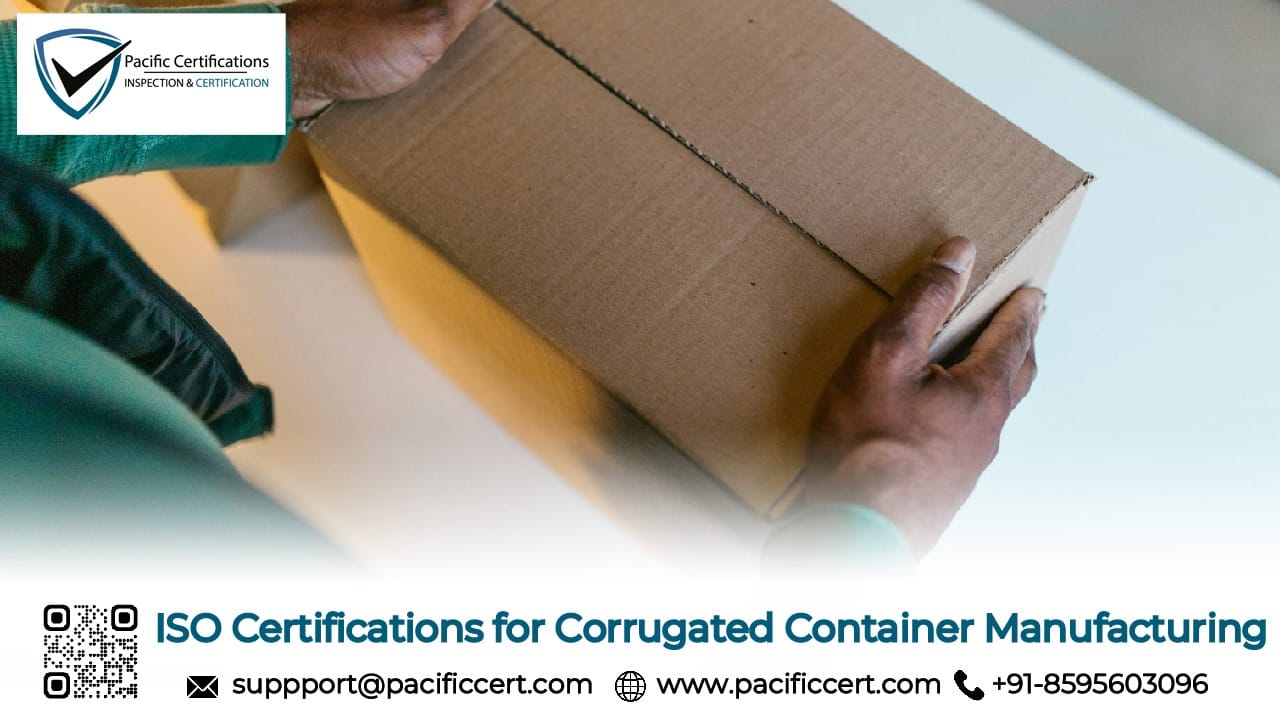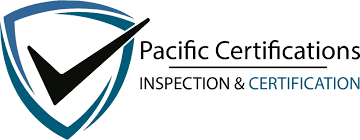ISO Certifications for Corrugated Container Manufacturing Businesses, Requirements and Benefits

Introduction
Corrugated container manufacturing plays an essential role in global logistics, e-commerce, and retail supply chains. These containers, made primarily from paperboard and recycled fiber, are the backbone of modern packaging and transportation systems. With increasing emphasis on sustainability, waste reduction, and product protection, ISO certifications provide manufacturers with structured frameworks to ensure consistent quality, environmental responsibility, and process efficiency.
The corrugated packaging market continues to expand alongside the global rise in online commerce and eco-friendly packaging initiatives. According to Fortune Business Insights, the global corrugated packaging market is expected to surpass USD 420 billion by 2030, growing at a CAGR of 5.9%. Certification to international standards such as ISO 9001, ISO 14001, and ISO 45001 helps manufacturers meet buyer expectations, comply with regulations, and build credibility with major retailers and exporters demanding traceable, sustainable production.
If your corrugated container manufacturing business is ready for ISO certification, reach out to us at [email protected] or call +91-8595603096 to get started.
Quality packaging protects more than products — it safeguards reputation, sustainability, and customer trust
Quick Summary
ISO certifications help corrugated container manufacturers control quality, ensure workplace safety, improve energy efficiency, and meet sustainability goals, strengthening their competitiveness in global packaging markets.
Applicable ISO Standards for Corrugated Container Manufacturing
Several ISO standards are particularly relevant for corrugated container manufacturers. Each standard addresses specific areas, from quality and environmental management to occupational safety. Here’s an overview of the key standards:
ISO Standard | Focus Area | Relevance to Corrugated Packaging |
|---|---|---|
ISO 9001:2015 | Quality Management | Ensures consistent product quality, process control, and customer satisfaction. |
ISO 14001:2015 | Environmental Management | Minimizes environmental impact through waste reduction, recycling, and responsible sourcing. |
ISO 45001:2018 | Occupational Health & Safety | Protects workers from risks related to machinery, dust, and chemical handling. |
ISO 50001:2018 | Energy Management | Improves energy performance in paper processing, corrugation, and printing operations. |
ISO 22301:2019 | Business Continuity | Maintains operations during disruptions such as supply shortages or machinery failure. |
ISO 12647-2:2013 | Printing Process Control | Ensures color consistency and print accuracy in packaging graphics and branding. |
ISO 9001:2015 - Quality Management System (QMS)
ISO 9001 is the global standard for quality management systems, applicable to any manufacturing industry, including corrugated container production. It focuses on quality management principles, customer satisfaction, and continuous improvement. For corrugated container manufacturers, ISO 9001 ensures that quality remains consistent across all production stages, from raw material selection to final product delivery.
ISO 14001:2015 - Environmental Management System (EMS)
ISO 14001 is designed to help organizations minimize environmental impact, comply with legal regulations, and continuously improve their environmental performance. Corrugated container manufacturers can utilize this standard to implement sustainable practices, reduce waste, manage energy use, and promote recycling.
ISO 45001:2018 - Occupational Health and Safety Management System
Worker safety is paramount in any manufacturing facility, and ISO 45001 provides a framework to improve workplace safety, reduce risks, and create a safer environment for employees. For corrugated container manufacturers, this standard ensures safety compliance in equipment handling, machine maintenance, and the overall workplace environment.
ISO 50001:2018 - Energy Management System
Energy efficiency is crucial in manufacturing, where energy use is a significant operational cost. ISO 50001 enables corrugated container manufacturers to establish systems for managing and optimizing energy use. Implementing this standard can help manufacturers reduce energy consumption, lower costs, and contribute to global efforts to combat climate change.
ISO 14044:2006 - Life Cycle Assessment (LCA)
ISO 14044 outlines principles for conducting a life cycle assessment, enabling manufacturers to measure the environmental impact of their products from raw material extraction to disposal. For corrugated container manufacturers, implementing ISO 14044 can provide insights into product sustainability and help meet eco-friendly market expectations.
ISO 18601 to ISO 18606 - Packaging and the Environment
This series focuses on sustainability in packaging, addressing various aspects such as the recyclability, compostability, and reusability of packaging materials. These standards can guide corrugated container manufacturers in producing environmentally friendly packaging solutions.
ISO 27001 - Information Security Management System
In the digital age, information security is vital for protecting intellectual property, customer data, and manufacturing secrets. ISO 27001 can be relevant for manufacturers who manage sensitive data on customers and suppliers, ensuring that data remains protected through an Information Security Management System (ISMS).
Click here to find out more applicable standards to your industry
We, at Pacific Certifications, are a globally accredited certification body offering ISO certification services tailored to the unique needs of the corrugated container manufacturing sector.
Email us at [email protected] to get your certification process started!
What are the requirements of ISO Certifications for Corrugated Container Manufacturing?
Corrugated container manufacturers must implement management systems that oversee production quality, safety, and environmental performance while ensuring compliance with regulations and customer standards. Below are the general and specific requirements:
- Define certification scope, covering paperboard conversion, corrugation, printing, cutting, and box assembly operations.
- Establish written policies for quality, safety, and environmental protection aligned with corporate and customer requirements.
- Develop documented procedures for material inspection, production control, maintenance, and finished-goods testing.
- Conduct risk assessments for machinery safety, fire hazards, and manual handling during production.
- Monitor and control key parameters such as board strength, moisture, adhesive quality, and print precision.
- Track supplier quality and ensure sustainable sourcing of paper and adhesives compliant with environmental regulations.
- Maintain waste management systems for scrap, dust collection, and recycling of corrugated offcuts.
- Provide training to all employees on equipment handling, quality control, and occupational safety practices.
- Carry out internal audits, corrective actions, and management reviews to ensure continual improvement.
- Implement energy performance tracking and preventive maintenance to enhance operational efficiency.
Specific requirements:
ISO 9001:2015 - Quality Management System (QMS) Requirements
- Leadership and Commitment: Senior management must demonstrate a commitment to quality, set clear objectives, and provide resources to implement a quality management system.
- Customer Focus: Emphasis on understanding customer needs, meeting their requirements, and increasing customer satisfaction.
- Process Approach: Processes should be mapped and managed to ensure that quality goals are met, with clear accountability and integration across departments.
- Risk-Based Thinking: Identify and address risks and opportunities to prevent undesired outcomes and capitalize on improvement opportunities.
- Documented Information: Maintain documents and records that demonstrate compliance with quality management requirements.
- Performance Evaluation: Regularly monitor and measure processes to ensure they meet planned results, and use findings for improvement.
- Continuous Improvement: Commit to ongoing improvement by analyzing performance data, implementing corrective actions, and setting improvement objectives.
ISO 14001:2015 - Environmental Management System (EMS) Requirements
- Environmental Policy: Develop a clear environmental policy outlining the organization’s commitment to environmental protection and sustainable practices.
- Environmental Aspects and Impacts: Identify aspects of operations that impact the environment, and evaluate their significance to prioritize actions.
- Compliance Obligations: Understand and comply with all relevant legal and regulatory environmental requirements.
- Objectives and Targets: Establish environmental objectives that are measurable and align with the organization’s environmental policy.
- Operational Control: Implement procedures and controls to minimize environmental impact, such as waste reduction and pollution prevention.
- Emergency Preparedness: Plan for environmental emergencies, such as chemical spills, by preparing procedures for prevention and response.
- Monitoring and Measurement: Regularly monitor, measure, and evaluate environmental performance to ensure objectives are being met.
- Continual Improvement: Continuously improve the environmental management system through reviews, corrective actions, and policy updates.
ISO 45001:2018 - Occupational Health and Safety Management System Requirements
- Leadership and Worker Participation: Involve top management and engage employees in health and safety initiatives.
- Hazard Identification and Risk Assessment: Identify workplace hazards, evaluate risks, and implement controls to minimize or eliminate risks.
- Health and Safety Policy: Establish and communicate a health and safety policy that reflects the organization’s commitment to a safe work environment.
- Training and Competency: Ensure that all workers are trained and competent in health and safety practices relevant to their roles.
- Operational Control: Develop and enforce procedures to manage high-risk activities, equipment handling, and hazardous substances.
- Emergency Preparedness and Response: Establish and test response procedures for emergencies to protect employee health and safety.
- Incident Investigation and Corrective Action: Investigate health and safety incidents, determine root causes, and implement corrective actions to prevent recurrence.
- Monitoring and Evaluation: Conduct regular health and safety audits, inspections, and reviews to ensure effectiveness and compliance.
ISO 50001:2018 - Energy Management System Requirements
- Energy Policy: Formulate an energy policy that commits to energy efficiency and continuous improvement in energy performance.
- Energy Planning: Conduct energy reviews, identify areas of significant energy use, and establish a baseline to track energy performance.
- Objectives, Targets, and Action Plans: Set measurable energy objectives and targets, and develop action plans to achieve them.
- Energy Performance Indicators (EnPIs): Establish and monitor EnPIs to measure progress against energy objectives and track improvements.
- Operational Control: Implement operational controls for equipment and systems to ensure energy efficiency.
- Procurement Practices: Consider energy efficiency when purchasing equipment, materials, or services, ensuring new investments support energy management goals.
- Employee Awareness and Training: Educate employees on energy efficiency practices and encourage energy-saving behaviors.
- Performance Evaluation and Improvement: Regularly evaluate energy management performance and identify areas for improvement.
Tip: Begin with ISO 9001 to stabilize product quality and customer satisfaction, then expand to ISO 14001 and ISO 45001 to strengthen sustainability and worker safety practices across production units.
What are the benefits of ISO Certifications for Corrugated Container Manufacturing?
Achieving ISO certification brings a range of benefits to corrugated container manufacturers, from operational improvements to enhanced market reputation. Here are some key benefits:
- ISO-certified systems ensure consistent corrugated board strength, print accuracy, and delivery reliability.
- Certification enhances brand reputation and builds customer confidence in supply quality and sustainability.
- Environmental management reduces energy use, waste, and emissions from adhesive and coating processes.
- Improved safety culture decreases workplace accidents and machine downtime.
- Certified operations comply more easily with export packaging and waste regulations.
- Documentation and audits create transparency and traceability throughout the manufacturing process.
- Certification supports participation in large-scale retail, FMCG, and e-commerce supply contracts that require ISO compliance.
- Energy and quality improvements lower production costs and improve profitability over time.
The corrugated packaging industry is shifting toward digital printing, recycled materials, and automation. Allied Market Research reports that recycled corrugated boxes account for nearly 70% of production in developed economies, reflecting stronger sustainability policies. Demand for lightweight, high-durability boxes in e-commerce and food packaging continues to rise, prompting manufacturers to adopt ISO 9001 and ISO 14001 as baseline certifications.
Energy-intensive operations such as drying, corrugation, and die-cutting have encouraged many producers to implement ISO 50001 to optimize power usage. Additionally, multinational clients increasingly require ISO 45001 for workplace safety assurance and ISO 22301 to ensure supply continuity. The industry’s move toward closed-loop recycling systems is positioning ISO certification as not just a compliance requirement but a strategic investment for future growth between 2025 and 2030.
How Pacific Certifications Can Help
Pacific Certifications, accredited by ABIS, provides impartial auditing and certification for corrugated packaging manufacturers under ISO/IEC 17021 and ISO/IEC 17024 frameworks. We certify organizations to standards such as ISO 9001, ISO 14001, ISO 45001, ISO 50001, and ISO 22301, supporting full management system compliance.
Our auditors conduct independent assessments focused on conformity, sustainability, and process effectiveness. We also offer accredited training programs, including Lead Auditor, Internal Auditor, and Awareness courses, enabling staff to maintain and improve certified systems.
If you need support with ISO certification for your Corrugated Container Manufacturing business, contact us at [email protected] or +91-8595603096.
Ready to get ISO certified?
Contact Pacific Certifications to begin your certification journey today!
Author: Palak
Suggested Certifications:
Read more: Pacific Blogs

